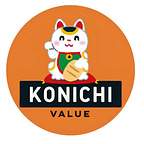In these dark times for stock markets all around the world, I’ve heard more and more people saying things like “Stock X has gone down 70% since November 2021. It’s so cheap you have to buy it!” or “A stock I own has gone down 50%. I need to buy more of it before it goes up again!”
To be honest, when I see a company losing 70% of its stock value, I instinctively want to buy it! I mean, it feels like a bargain because surely, the stock will bounce back in no time…
This phenomenon is often referred to as the Anchoring effect. It’s a psychological flaw in our ancient monkey-brains where we get “anchored” to a price and think that anything deviating from it is either too high or too low. Marketers use this flaw all the time to trick us! How often haven’t you seen things like “Product X 50% off!” and buy it even though you had no intention of doing so before coming to the store.
Buying a chocolate bar that’s 50% off will likely not break you solvency, but with stocks it literary can. The problem with this thinking is that stocks don’t have a “memory” of what they used to cost. There is nothing intrinsic in a stock that says that if it loses half its value, it has more likelihood of going up again.
There is a trick to not fall for this trap
I want to teach you a little mind game I use to not fall for the anchoring effect.
Let’s say you go to your local grocer to buy something you know the price of, an onion for example. You walk in and you see a sign that says “Onions - $100/each”. You know that onions usually cost $0,5 so you’re a bit shocked to say the least.
Naturally, you call on a store clerk to ask if there’s anything special with the onions today, to which she replies “no, we just marked up the price today”.
Would you still buy that onion?
Most likely you’d be shocked an appalled, but realizing there’s nothing you could do, you’d just buy something else and go on about your day.
The next day you go to the same grocer and see a big sign at the entrance saying “Onions 50% off! Only $50/each!”
What a great deal, right? Well, no! It’s a stupid price and you should definitely not buy that onion!
Its easy to understand why buying an onion for $100 or $50 is stupid, but when it comes to stocks, a lot of people seem to throw this thinking out the window.
When a stock goes up 50%, 100%, or even a 1000%, a lot of people think “Wow, the stock goes up so quickly I need to buy it before I miss out!”
Or when the stock loses value, people go “OMG, it’s trading at a discount, I need to buy more!”. What these people forget to think about is what the stock should be worth in the first place, or what its intrinsic value is.
Of course, knowing what you should pay for a stock is harder than for an onion, but if you know a stock well, you know when it’s overpriced or undervalued.
I won’t go into the details on how to calculate the intrinsic value of a company in this post but the key idea is that it should be based on the company’s assets, present profits, and its realistic profit potential in the near future. Naturally, if the company has high realistic growth potential it should be valued higher, but not astronomically high.
Take Tesla for example. The company is truly innovative and its profits are growing rapidly every year. However, even with the stock losing almost 50% if its value since the beginning of this year, its still trading at around 100x its yearly earnings, or a P/E of 100.
Just to get a sense of how ludicrous this price is, you can think of it like this: if Tesla continued to sell as many cars with the same profits as they do today, it would take them a 100 years to buy all their own stocks at this price…
If you know this, I don’t think you’d buy Tesla today, even with the 50% discount from January 2022...
So to sum it up, if you know the intrinsic value of a stock, just like you know the value of an onion, you know what it is worth and when its worth buying.















